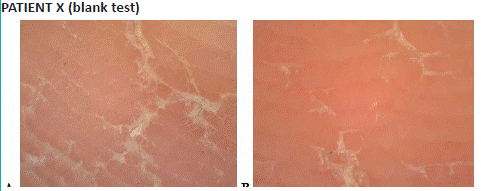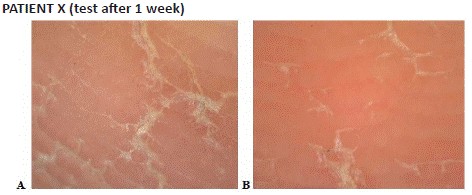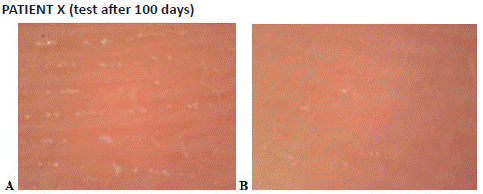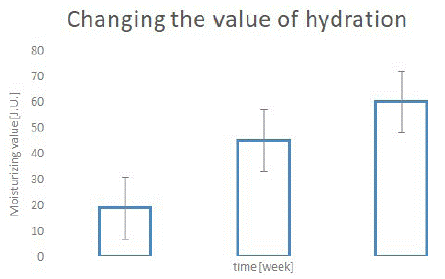
Research Article
Austin Chem Eng. 2023; 10(2): 1102.
The Use of Tofu Whey from Food Industry Waste in Podological Care
Joanna Igielska-Kalwat1,2*; Ewa Kilian-Pieta1,2
¹Faculty of Cosmetology, University of Education and Therapy, Poland
²Symbiosis Laboratory, Poznan Science and Technology Park, Poland
*Corresponding author: Joanna Igielska-Kalwat Faculty of Cosmetology, University of Education and Therapy, Grabowa 22, 61-473 Poznan, Poland. Email: j.kalwat@wseit.edu.pl
Received: July 18, 2023 Accepted: August 22, 2023 Published: August 29, 2023
Abstract
The aim of the study was to create cosmetic formulations used for washing and conditioning based on natural whey derived from tofu. Tofu whey used in the production of hair cosmetics turns out to be valuable waste that replaces water. Whey is an ingredient rich in proteins, oligosaccharides and isoflavones. When trying to follow the principles of sustainable development, we need also to be responsible for protecting water resources. Using whey, we limit water consumption to the necessary minimum. Hence, we also support no water waste trend.
Tofu whey, which is a valuable waste that replaces water, was used in the production of podology products.
The research was conducted following the approval of the Bioethics Committee, resolution number 223/22. Tests confirming or excluding the properties and performance of tofu whey declared by the Ordering Party were carried out at probands’ homes and in the Dermatology Center (Centrum Dermatologii Sp. z o.o.) in Poznan. The probands were volunteers. A group of 30 people was selected for the study according to the indications for the use of the product submitted for experiments. The selection of probands was carried out after a preliminary assessment of the condition of feet and health.
Due to the purpose of the product, the study involved people who declared a desire to improve the appearance and condition of their feet. The study used the imaging method with the participation of a microcamera.
Keywords: Waterless; Tofu whey; Sustainable development; UPCYCLING); MicroCAMERA ® Connected; Cosmetics formulations.
Introduction
Bioferment from Okara Tofu (OKARA - food waste - UPCYCLING) is the result of a naturally occurring fermentation process, which consists in biotransformation / transformation / of complex chemical compounds (from okara tofu) into simpler, generally better absorbable / bioavailable [1]. We used the okara fermentation (TOFU) process instead of chemical hydrolysis of soy proteins, which consists in the biotransformation of the complex structure of plant tissue into simple compounds with the participation of microorganisms and enzyme proteins synthesized by probiotic bacteria of the genus Lactobacillus. The European Green Deal The "Green Deal" are regulations that aim to transform the European Union into a modern, zero-emission and resource-saving economy. By 2050, it is planned to reduce greenhouse gas emissions by 55%, which requires transforming the industry into innovative technological solutions in line with the Circular Economy. Biotechnological methods such as fermentation, microfiltration or hydrolysis are therefore a key field of science that enables the development and implementation of a model of production and consumption of cosmetics in a closed circuit. Thanks to the production of the ToforU serum using waste whey from the food production of Tofu cheese, whose processing with the above-mentioned biotechnological methods, we can recover valuable active ingredients of cosmetics, such as inactive hydrolyzed biomass of lactobacillus bacteria, hydrolyzed amino acids and a filtrate that is a substitute for technological water. Thanks to such technology, it is possible not only to produce them in accordance with the green and clean "Green Line" chemistry with a high index of naturalness, but also to use this technology to recuperate waste generated during production, i.e. mixer washings after the production of cosmetic emulsion, thus saving resources in line with the trend water upcycle
Thanks to biotechnological methods, we obtain the necessary, effective and innovative ingredients for the production of cosmetics, saving natural resources of the environment.
This work is an attempt to indicate an innovative technology for the production of cosmetics using biotechnological methods aimed at the use of circular processes, i.e. "take waste - process it into raw material - produce cosmetic - recover waste", reducing the amount of waste as an alternative to linear production processes: take a raw material from the natural environment - produce a cosmetic ingredient - produce a cosmetic - consume - throw away". The most important motivation for the production of cosmetics containing whey from tofu was the waterless trend. Instead of the main base ingredient, which is water, tofu whey was used - a by-product from the production of tofu coming from the food industry. The food industry is the branch of economy that consumes the most water. Food waste is thus a valuable resource. Therefore, the re-use of existing materials (upcycling) for the production of cosmetics has become the main technological task of the discussed cosmetics (Figure 1). The zero-waste trend, which promotes the reuse of existing materials for the production of cosmetics, has also been considered. Additionally, tofu whey is a multifunctional active ingredient [2].

Figure 1: (A, B) Photo of the feet from probands X before the application of the Tofu whey serum.
Additionally, using whey obtained from tofu in the production of podology cosmetics is in line with both the upcycling and the green chemistry trend.
Materials and Methods
Materials
In the initial phase of the research, cosmetics from the pedology serum were created with the aim of effective elimination of problems of the feet. Incidentally, the use of antimicrobial active substances has become part of the desired trends regarding skin and hair care during the coronavirus pandemic.
The formulation has been created in such a way as not to cause intolerance to any of the raw materials they contain. The main ingredient of the series is tofu whey used in the amount of 1-5% of the total mass.
Preparation of Tofu Whey Serum
The oil phase was prepared in a 100 ml beaker (basis weight and names of substances are given in Table 2). Phase I was melted in a water bath (80-85°C). Phase II was heated to the same temperature and then mixed. Both were stirred for 30 minutes. After the mixture had cooled to 55°C, it was homogenized until a homogeneous emulsion was obtained with the IKA T 50 basic Ultra-Turrax homogenizer with rotational speed of 6000 rpm [3,4]. Phase III was heated to 35°C and magnetically combined with other phases when the target temperature of 35°C was reached. The mixture was continuously vigorously stirred. It was left on the stirrer to cool completely. A white homogeneous emulsion was obtained.
Tests Confirming the Safety and the Manufacturer’s Declaration for Tofu Whey Serum
In the subsequent part of the study, tests were performed in accordance with the Act on cosmetic products of October 4, 2018 (Polish Journal of Laws of 2018, item 2227) (Art. 11(3) [5]. Their aim was to assess the impact of the cosmetic on the safety of human health - including studies on skin tolerance to the tested cosmetic at the place of its application. Apparatus confirmation of the type of actions of the preparations declared by the Manufacturer was carried out. The research was conducted following the approval of the Bioethics Committee, resolution number 640/20. Tests confirming or excluding the properties and performance of tofu whey serum, declared by the Ordering Party were carried out at probands' homes and in the Dermatology Center (Centrum Dermatologii Sp. z o.o.) in Poznan under the supervision of a dermatologist, chemist and cosmetologist. The probands were volunteers. A group of 30 people was selected for the study, corresponding to the indications for the use of the product submitted for experiments. The selection of probands was carried out according to the preliminary assessment of the condition of their feet and health. Due to the intended use of the product, the study involved people who declared their willingness to improve the appearance and condition of the feet **p<0.01 as a significant improvement from week 0 to week 14 (W14), determined by the post-hoc test. Total trial group (n=30). Measurements were taken every fourteen weeks.
Methodology of the Research: At home (home panel): Test probands qualified for the research received one package containing serum. They undertook to use the received sample on a regular basis in accordance with the application rules suggested by the manufacturer. Probands should not have been using preparations of the same or analogous purpose during the time of the study. Volunteers were to observe the reaction of the feet at the application sites. They should note in detail the remarks concerning the functional properties of the tested cosmetic. In the event of any negative symptoms at the place of application of cosmetics, they were to stop using cosmetics and contact the person conducting the examination immediately. No special requirements were imposed on the participants of the study, assuming that the effects of this type of cosmetic should be tested in the natural conditions in which it would be used in practice. The results of the experiment could only be influenced by factors such as health, type and condition of hair and skin, genetic conditions, individual traits, individual preferences, lifestyle, and environmental conditions.
Apparatus Tests Carried out with MicroCAMERA ® Connected
The research used the imaging method involving a microcamera for the assessment of the condition of the skin and the follicular area. MicroCAMERA ® Connected is a device designed for the examination of the scalp and hair analysis. Owing to very high magnification up to 200 times, a single hair can be viewed in great detail. The built-in polarization filter minimizes the effect of glare on the feet [6,7]. As already mentioned, the Tofu whey serum study was conducted in cooperation with the Symbiosis Dermatology Center on a group of 30 probands. Before starting the test, each volunteer was assigned a cosmetic sample. For the subsequent 100 days, the study participants were asked to test the samples at home (in-home-use-test methodology). With the help of a microcamera, the experimenter examined the condition of the feet of the patients before and after using the preparations. A blank analysis was performed prior to starting product application. The second test was carried out after 100 days, during which the probands undertook to use the preparation regularly.
The Study of Biophysical Parameters was Conducted Using the Sond MPA 580 Courage + Khazak Electronic GmbH Syndrome
The study of biophysical parameters was conducted using the MPA 580 Courage + Khazak Electronic GmbH syndrome combined with a computer and equipped with a probe for measuring temperature and humidity (level of hydration of the epidermis, elasticity, measurement of transmission water loss and pH).
Results and Discussion
Instrument Tests Carried out with the MicroCAMERA ® Connecteds
Probands using the Tofu whey serum were tested during the blank test and after 100 days. The research used the imaging method involving a micro camera with the assessment of the condition of the skin and the follicular area (MicroCAMERA ® Connected). A compilation of photos presented below shows the difference before the application of Tofu whey serum and after the 100-day study. In the most severe cases, the frequency of follow-up examinations was increased. The photos below were taken of different areas of the scalp.
Already after the first use of the Tofor serum, a reduction in the amount of accumulated dead skin was noticed. Along with the duration of the research, it was noticed that the preparation prevented excessive corner of the feet. In addition, smoothing, moisturizing the skin of the feet and reduction of cracks occurring on the feet and above all on the heels (Figure 2.3). You can also notice a decrease in skin peeling [8,9].

Figure 2: (A, B) Photo of the feet from probands X after 1 week of application of the Tofu whey serum.

Figure 3: (A, B) Photo of the feet from probands X after 100 days of application of the Tofu whey serum.

Figure 4: (A, B) Photo of the feet from probands Y before the application of the Tofu whey serum.
The results of the next patient were analogous, after the first use a reduction in the accumulation of dead skin and moisturized foot skin was noticed (Figure 5). In addition, the probant was found after applying the cosmetic to accelerate regeneration and relieving skin defects caused by mechanical injury. Mechanically damage after a week of application decreased significantly, only the accumulated dead skin remained. In the last week of research, the complete smoothing of the foot of the foot and the injury of the injury could be seen (Figure 6) [10].

Figure 5: (A, B) Photo of the feet from probands X after 1 week of application of the Tofu whey serum.

Figure 6: (A, B) Photo of the feet from probands Y before the application of the Tofu whey serum.
The Study of Biophysical Parameters was Conducted Using the Sond MPA 580 Courage + Khazak Electronic GmbH Syndrome
The purpose of the study was to check the skin tolerance and the effectiveness of cosmetic formulation, whose key ingredients are selected in such a way as to minimize emerging problems regarding the skin of the feet and, above all, the heels. The experience has contributed to confirmation of the effectiveness of the product affecting the improvement of the biological parameters of the skin.
The average level of moisturizing the probable feet is presented below (Figure 7).

Figure 7: The average change in the hydration value of the probants measured before and during the study, after the first and fourth week (n=30), *-p<0.05. The measurement was made in selected areas of the foot.
Based on the above chart, it can be seen that all people who took part in the study with the end of the experience had better the results of the hydration parameter. This parameter was very important in the entire study, because it is one of the main parameters confirming the effectiveness of the product in relation to the dry skin of the feet. The skin is a complex mechanism that tries to restore the proper biophysical parameters of the skin [11-13]. The impairment of the barrier function is manifested by a significant decrease in the level of hydration, which is why it requires in particular to apply a serum containing a ready moisturizing complex, which can complement the necessary NMF concentration. Thanks to the use of a series in the recipe, among others, urea (INCI: Urea), which is a component of NMF [14-18]. This substance is necessary for proper keratosis and maintaining the level of hydration. Modifies the chemical structure of proteins in the epidermis cells by covering the water binding places, thanks to which it increases its content in the stratum corneum. Thanks to this, the skin is properly moisturized and elastic. Another used gluconolactone (INCI: Gluconolactone) is a natural skin ingredient. Nourishes and strongly moisturizes, even the most demanding and dry skin. It accelerates cell regeneration, thanks to which it supports the reconstruction of the lipid barrier. It improves the skin structure, eliminating the feeling of rough and unpleasant to the touch of the skin [19].
INCI
Content, % up to 100 [±6,00]
Phase 1
Cetearyl Alcohol (and)
Cetyl Alcohol (and)
Caprylic/Capric Triglyceride (and)
Linum Usitatissmum Seed Oil/ Aminopropanediol esters Tocopherol acetate (and)5.00 - 13.00
Phase 2
Tofu whey
Behentrimonium Methosulfate (and) Cetearyl Alcohol (and) Hydroxypropyltrimonium InuliDs.
4.00 - 4.80Phase 3
Bioferment with tofu whey
Gluconolacton, Sodium Benzoate
Shimic Acid0.20 - 0.50
1.00 - 1.50
Ds.
Table 1: Ingredients of the Tofu whey serum.
The time needed to restore the appropriate hydration parameter would be much longer if it wasn't for the care in question. Changes in the parameter. Moisturizing ranged on an average of 19-60 [J.U.] [20]. Table 2 presents an interpretation of the results. The longer the time of use of the cosmetic, the more the parameter improved.
The degree of hydration of the epidermis
Measurement result [j.u.]
Very dry skin
<30
Dry skin
30-45
The skin is sufficiently moisturized
>45
Table 2: Interpretation of the epidermal hydration results.
Conclusions
Tofu what serum is dedicated as a pedagogical product thanks to its post-biotic, nourishing and antioxidant properties. As a result of the fermentation process, a number of compounds with functional potential are released from the plant material, such as acetic acid, protocatechuic acid, caffeic acid, gallic acid and reuterin. All of the above compounds are characterized by a strong antioxidant potential. In addition, compounds such as lactic acid and acetic acid are substances with probiotic and exfoliating properties. The effect of the fermentation process is also the presence of post-biotic compounds such as glutathione peroxidase, superoxide dismutase, bacteriocins and bacterial components such as peptidoglycan, polysaccharides. Thanks to the above-mentioned substances and the presence of probiotic cell fragments, the raw material has an immunomodulatory and immunostimulating effect, which is manifested in the increased activity of interleukin 6, interleukin 8, a-TNF against substances with pro-inflammatory potential [20]. Ferment obtained in the fermentation of okara, a by-product of soy processing, containing a high concentration of protein, fat and fiber. Thanks to the fermentation process carried out by a consortium of three species of lactic acid bacteria (Lactobacillus rhamnosus LR06 (DSM 21981), Lactobacillus acidophilus LAO6 (DSM 23033), Lactobacillus reuteri Lb26), it was enriched with short-chain fatty acids, amino acids, vitamins, postbiotics in the form of wall fragments mobile. The raw material is characterized by three unique features, such as:
- the presence of reuterin synthesized by bacteria of the species Lactobacillus reuteri
- high antioxidant potential expressed as chelating activity at the level of 18-22 ppm, % ABTS radical quenching capacity of 9.0-11.0 mmol/Tx/g d.m. and DPPH 4.0-8.0 mmolTx/g d.m
- The presence of amino acids of microbial origin such as threonine, methionine, lysine and tryptophan
- The presence of mineral compounds of microbial origin such as silicon, potassium, magnesium
- Antimicrobial potential against Propionibacterium acnes ATCC 11828 I Staphylococcus aureus [21].
Content in the composition of Bio-Toforyou - INCI name: Aqua, Lactobacillus / Soybean Pulp (okara) Ferment Lysate, Lactic acid, acetic acid, Propionic acid, Triethyl citrate, Glyceryl caprylate, Benzoic acid, which is a valuable source of inactive probiotic biomass of lactic acid bacteria , thanks to which it perfectly soothes irritations and restores the proper pH value [22].
Technology and Production
As part of the project, on the basis of research and technological tests carried out in laboratory conditions, it is assumed that optimal technological and technical solutions will be developed, taking into account economic and environmental aspects, and above all, the health and commercial quality of obtaining products with increased added value. It is also assumed that selected technological operations will be checked on a limited scale on a model test stand. As a result, trial batches of new semi-finished products and products with defined pro-health properties will be obtained. Based on the results obtained, assumptions for a pilot line for processing waste materials will be developed.
Author Statements
Author Contributions
Conceptualization, J.I-K.; methodology, J.I-K., E.K.-P.; software, J.I-K., E.K.-P., and S.P.-G.; validation: J.I-K., E.K.-P.; formal analysis, J.I-K.; investigation, J.I-K., resources, J.I-K., E.K.-P., and S.P.-G.; data curation, J.I-K.; visualization, J.I-K.; supervision, E.K.-P., and S.P.-G; project administration, J.I-K; writing original draft preparation, J.I-K; writing - review and editing, J.I-K., E.K.-P., and S.P.-G.All authors have read and agreed to the published version of the manuscript.
Funding
This research received no external funding.
Institutional Review Board Statement
Bioethics Committee consent, resolution number 640/20.
Data Availability Statement
The data presented in this study are available on request from the corresponding author.
Conflicts of Interest
The authors declare no conflict of interest.
Acknowledgments
Support from University of Education and Therapy and Symbiosis Laboratory is acknowledge.
References
- Igielska-Kalwat J, Kilian-Pieta E, Poloczanska-Godek S. Trends in the manufacture and design of sustainable cosmetics. Clinical Dermatology Open Access. 2023; 8: 000297.
- Igielska-Kalwat J, Kilian-Pieta E. The use of tofu whey from food industry in the cate of the scalp and hair. J Sci Tech Reasearch. 2023, 4: 41774.
- Mitkowski PT, Szaferski W. Production of emulsion in tank mixer with sieve bottom. ChERD. 2016; 109: 618-27.
- Igielska-Kalwat J, Kilian-Pieta E, Poloczanska-Godek S. The use of natural collagen obtained.
- The cosmetics act of 4.10.2018. Pol J Laws. 2018; 11: 2227.
- Baird SA, Skinner CM, Trail S, Frankis JS. Anhydrosis in the diabetic foot: a comparison of two urea creams. Diabet Foot. 2003; J6: 122-36.
- British Medical Association, Royal Pharmaceutical Society of Great Britain. British National Formulary, Number 50. London: BMJ Publishing Group/RPSGB; 2005.
- Chiodo B. The use of emollients in dry skin therapy. J Community Nurs. 2008; 22: 22-6.
- Crowther JM, Sieg A, Blenkiron P, Marcott C, Matts PJ, Kaczvinsky JR, et al. Measuring the effects of topical moisturizers on changes in stratum corneum thickness, water gradients and hydration in vivo. Br J Dermatol. 2008; 159: 567-77.
- Flynn TC, Petros J, Clark RE, Viehman GE. Dry skin and moisturizers. Clin Dermatol. 2001; 19: 387-92.
- Greene DA, Stevens MJ, Feldman EL. Diabetic neuropathy: scope of the syndrome. Am J Med. 1999; 107: 2S-8S.
- Holden C, English J, Hoare C, Jordan A, Kownacki S, Turnbull R, et al. Advised best practice for the use of emol- lients in eczema and other dry skin conditions. J Dermatolog Treat. 2002; 13: 103-6.
- Kraft JN, Lynde CW. Moisturizers: what they are and a practical approach to product selection. Skin Ther Lett. 2005; 10: 1-8.
- Lodén M. The clinical benefit of moisturizers. J Eur Acad Dermatol Venereol. 2005; 19: 672-88.
- Lodén M, Wessman W. The influence of a cream containing 20% glycerin and its vehicle on skin barrier properties. Int J Cosmet Sci. 2001; 23: 115-19.
- Lynde CW. Moisturizers: what they are and how they work. Skin Ther Lett. 2001; 6: 3-5.
- Nazarko L. Maintaining the condition of aging skin. Nurs Resid Care. 2007; 9: 160-3.
- O’Donnell M, Lorimer DL, Forster MSK. Clinical therapeutics. In: Lorimer DL, French G, O’Donnell M, Burrow JG, editors. Neal’s Disorders of the Foot: diagno- sis and management. 6th ed. London: Churchill Livingstone. 2002; 431.
- Peters J. Exploring the use of emollient therapy in dermatological nursing. Br J Community Nurs. 2006; 11: 194-201.
- Rawlings AV, Canestrari DA, Dobkowski B. Moisturizer technology versus clinical performance. Dermatol Ther. 2004; 17: 49-56.
- Rees M. Managing atopic eczema. Prim Health Care. 2002; 12: 27-32. Schwartz AR, Centurion SA. Thomas I. Moisturizers; 2009. eMedicine dermatology. Available from: http://tinyurl.com/7zcgjrt.
- Serup J, Winther A, Blichmann CW. Effects of repeated application of a mois- turizer. Acta Derm Venereol. 1989; 69: 457-9.